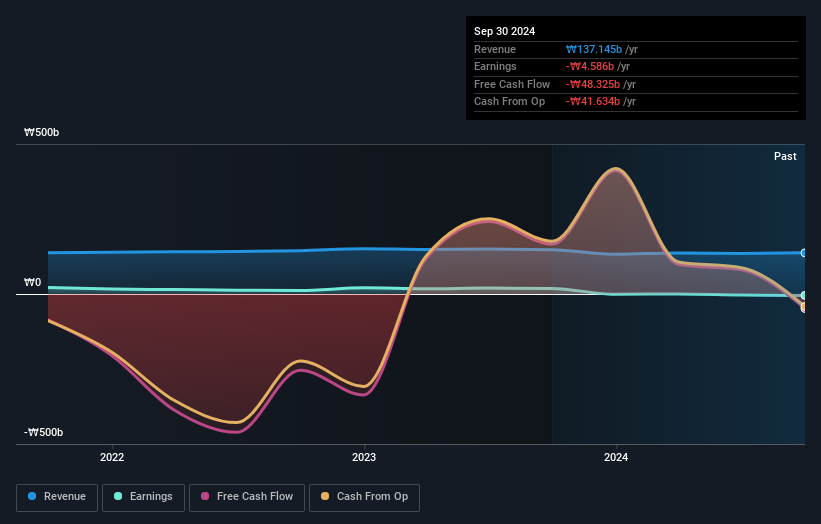- South Korea
- /
- Banks
- /
- KOSE:A006220
Despite shrinking by ₩30b in the past week, Jeju Bank (KRX:006220) shareholders are still up 87% over 5 years

Jeju Bank (KRX:006220) shareholders might be concerned after seeing the share price drop 18% in the last quarter. On the bright side the returns have been quite good over the last half decade. After all, the share price is up a market-beating 71% in that time.
While this past week has detracted from the company's five-year return, let's look at the recent trends of the underlying business and see if the gains have been in alignment.
View our latest analysis for Jeju Bank
To paraphrase Benjamin Graham: Over the short term the market is a voting machine, but over the long term it's a weighing machine. One way to examine how market sentiment has changed over time is to look at the interaction between a company's share price and its earnings per share (EPS).
During five years of share price growth, Jeju Bank actually saw its EPS drop 31% per year.
Essentially, it doesn't seem likely that investors are focused on EPS. Because earnings per share don't seem to match up with the share price, we'll take a look at other metrics instead.
The modest 1.4% dividend yield is unlikely to be propping up the share price. It is not great to see that revenue has dropped by 0.2% per year over five years. It certainly surprises us that the share price is up, but perhaps a closer examination of the data will yield answers.
You can see below how earnings and revenue have changed over time (discover the exact values by clicking on the image).

Take a more thorough look at Jeju Bank's financial health with this free report on its balance sheet.
What About Dividends?
It is important to consider the total shareholder return, as well as the share price return, for any given stock. The TSR is a return calculation that accounts for the value of cash dividends (assuming that any dividend received was reinvested) and the calculated value of any discounted capital raisings and spin-offs. It's fair to say that the TSR gives a more complete picture for stocks that pay a dividend. In the case of Jeju Bank, it has a TSR of 87% for the last 5 years. That exceeds its share price return that we previously mentioned. This is largely a result of its dividend payments!
A Different Perspective
We regret to report that Jeju Bank shareholders are down 13% for the year (even including dividends). Unfortunately, that's worse than the broader market decline of 4.9%. However, it could simply be that the share price has been impacted by broader market jitters. It might be worth keeping an eye on the fundamentals, in case there's a good opportunity. Longer term investors wouldn't be so upset, since they would have made 13%, each year, over five years. If the fundamental data continues to indicate long term sustainable growth, the current sell-off could be an opportunity worth considering. While it is well worth considering the different impacts that market conditions can have on the share price, there are other factors that are even more important. Take risks, for example - Jeju Bank has 2 warning signs (and 1 which makes us a bit uncomfortable) we think you should know about.
Of course, you might find a fantastic investment by looking elsewhere. So take a peek at this free list of companies we expect will grow earnings.
Please note, the market returns quoted in this article reflect the market weighted average returns of stocks that currently trade on South Korean exchanges.
New: Manage All Your Stock Portfolios in One Place
We've created the ultimate portfolio companion for stock investors, and it's free.
• Connect an unlimited number of Portfolios and see your total in one currency
• Be alerted to new Warning Signs or Risks via email or mobile
• Track the Fair Value of your stocks
Have feedback on this article? Concerned about the content? Get in touch with us directly. Alternatively, email editorial-team (at) simplywallst.com.
This article by Simply Wall St is general in nature. We provide commentary based on historical data and analyst forecasts only using an unbiased methodology and our articles are not intended to be financial advice. It does not constitute a recommendation to buy or sell any stock, and does not take account of your objectives, or your financial situation. We aim to bring you long-term focused analysis driven by fundamental data. Note that our analysis may not factor in the latest price-sensitive company announcements or qualitative material. Simply Wall St has no position in any stocks mentioned.
About KOSE:A006220
Jeju Bank
Engages in the provision of commercial banking products and services in South Korea.
Adequate balance sheet unattractive dividend payer.

